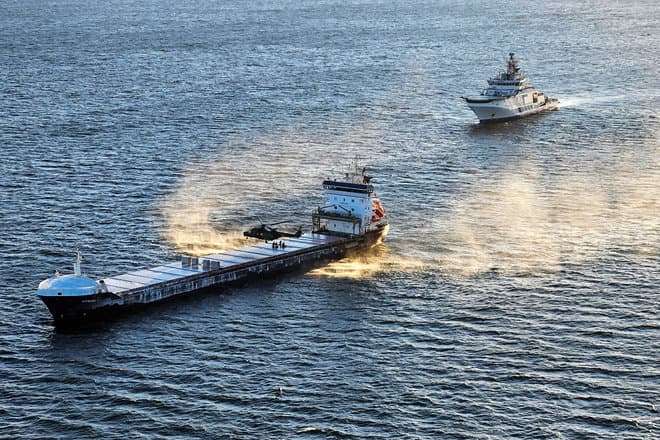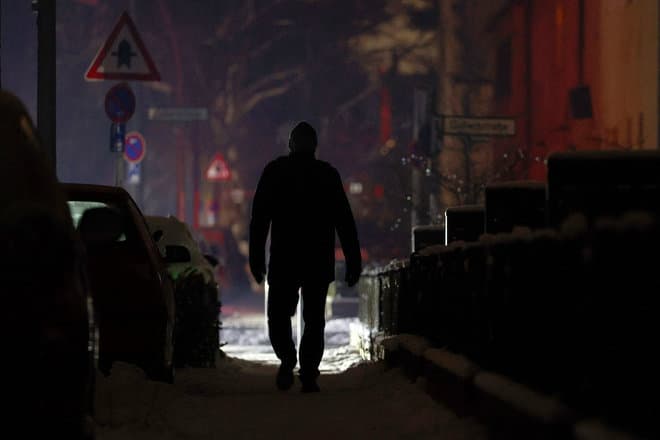
A shipping project for the German wind farms Borkum Riffgrund and Gode Wind 3 & 4, which is taking place from Gemini Kaj at the port of Esbjerg, is a breakthrough in relation to the work with offshore wind, as it is carried out on enterprise-like terms. It has brought together an alliance of the trade unions Danish Electrical Association, Metal, Tin and Plumbers' Association, 3F Esbjerg and 3F Transport Esbjerg.
- This is the first time in the 17 years that we have handled wind turbines here at the port that it is taking place on enterprise-like terms, says 3F Transport Esbjerg's chairman, Jakob Lykke, in front of the shipping site at the Port of Esbjerg and elaborates:
- Now you choose the lowest of the lowest. It is a type of working conditions that you normally only see in agriculture and horticulture. Here, 111 men work behind a fence at the Port of Esbjerg, and they don't even need to have a Danish account. You could also ask, do they pay taxes in this country?
The unions have tried to contact the workers behind the fence.
- No one knows where they live. And they are locked up behind a fence. My members have tried to contact them. The only thing they will say is that they work a lot, explains Jakob Lykke about the employees, who are presumed to come from Eastern European countries such as Poland and Romania. He acknowledges that there is a collective agreement - but it is for a salary and conditions that do not suit the Danish labor market.
Holds Ørsted responsible
For the shipping projects of the German wind farms Borkum Riffgrund and Gode Wind 3 & 4, Ørsted has chosen Siemens Gamesa, which in turn has chosen the Polish company Fairwind. The reason the unions are now calling it quits is that Fairwind is expanding.
- Fairwind is starting three new projects up until next year, and it's a race to the bottom. They are spreading out across the harbor with these working conditions. We must remember that it is Ørsted, as a state-owned company, that is behind this. And the salary has never been as low as it is now, says Jakob Lykke, who
He fears that even worse conditions are on the way.
- What happens when BP or Shell come here with their wind projects? What working conditions can we expect them to bring? We must protect the Danish model and what it means for the Port of Esbjerg, he says.
A looming labor dispute?
In April, the dock workers in Esbjerg blocked the installation ship Seaway Ventus because the seafarers on board lacked a collective agreement. At that time, a collective agreement was reached after a short blockade with international support. Whether something similar will happen again is still unknown.
- We are in close contact with the organizations at the ports in Germany, the USA and Australia. That is, with Verdi, the International Longshoremen's Association (ILA) and the Maritime Union of Australia (MUA), Jakob Lykke continues:
- I can't say anything about a work stoppage. I just hope that Ørsted comes to their senses, as they did with Seaway Ventus. We hold Ørsted responsible for this.
DOI.dk has tried in vain to get a comment from Fairwind and Siemens Gamesa. DOI.dk has been in contact with Ørsted, who is working on a comment.
Text, graphics, images, sound, and other content on this website are protected under copyright law. DK Medier reserves all rights to the content, including the right to exploit the content for the purpose of text and data mining, cf. Section 11b of the Copyright Act and Article 4 of the DSM Directive.
Customers with IP agreements/major customer agreements may only share Danish Offshore Industry articles internally for the purpose of handling specific cases. Sharing in connection with specific cases refers to journaling, archiving, or similar uses.
Customers with a personal subscription/login may not share Danish Offshore Industry articles with individuals who do not themselves have a personal subscription to Danish Offshore Industry.
Any deviation from the above requires written consent from DK Medier.





















